
Muslim humanitarian actors are increasingly recognized as important contributors in humanitarian and development efforts. In order to take the global partnership for development seriously, it is vital to understand this rapidly changing humanitarian landscape and how the whole range of humanitarian actors are working.
The new project, The Power of Ideas: Muslim Humanitarians and the SDGs (HUMA), will address this challenge. The project has today received 3 year funding from the NORGLOBAL Programme of the Research Council of Norway.
Congratulations to project leader Kaja Borchgrevink and her project colleague at PRIO, Marta Bivand Erdal!
While humanitarian needs are increasing, traditional funding for humanitarian aid is diminishing. This requires new partnerships for development and humanitarian aid, recognized in SDG 17, and endorsed by the Norwegian government’s policy.
The United Nation’s Agenda 2030 – setting the 17 Sustainable Development Goals (SDGs) - calls for new, global partnerships for sustainable development (SDG 17), recognizing the significance of including private and public, secular and religious actors. Actors who have earlier been skeptical of universalist agendas (such as human rights), including Muslim humanitarian actors, have now endorsed Agenda 2030. The SDGs thus appear to have broader acceptance than did earlier global agendas. In order to take the global partnership for development seriously, it is vital to understand this rapidly changing humanitarian landscape and how the whole range of humanitarian actors are working.
Non-PRIO project members
- Gina Lende (MF)
- Arne Strand (CMI)
- Amelia Fauzia (Social Trust Fund/UiN, Indonesia)
- Mustapha Hashim Kurfi (Bayero University, Kano, Nigeria)
- Abdul Rauf (University of Peshawar)





